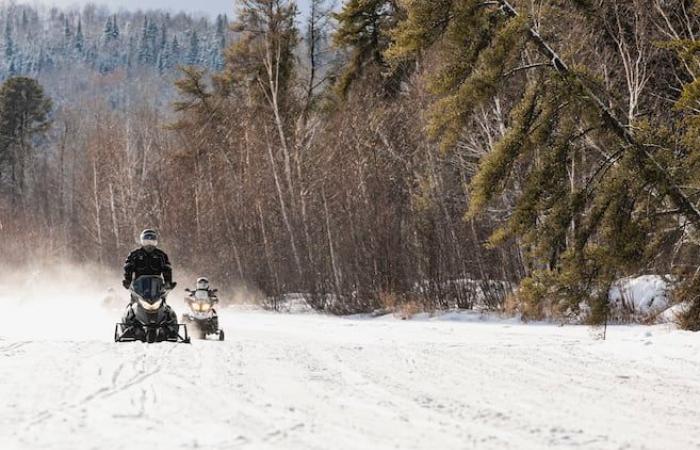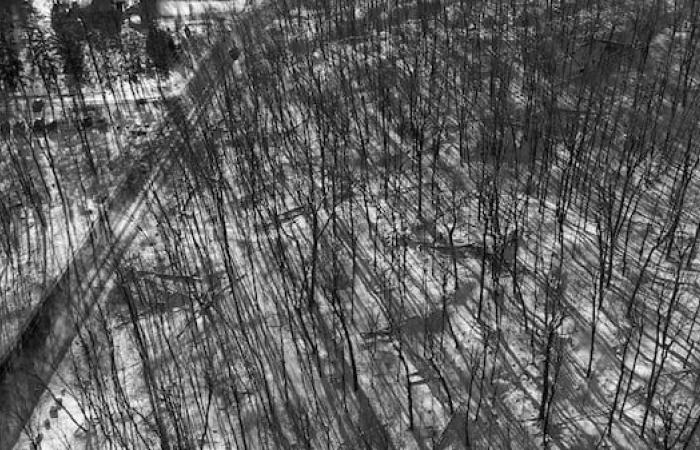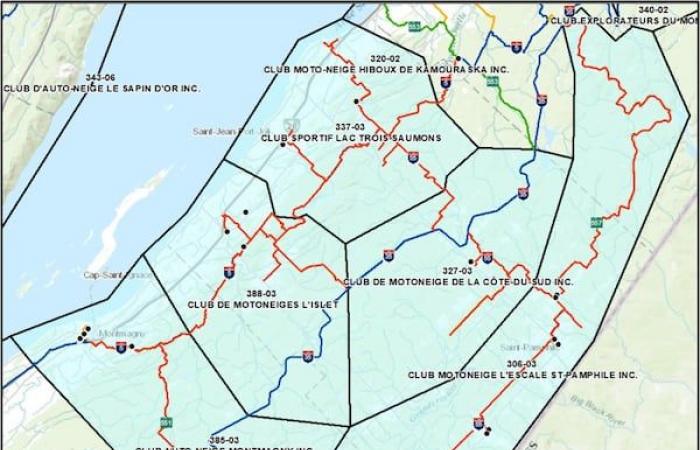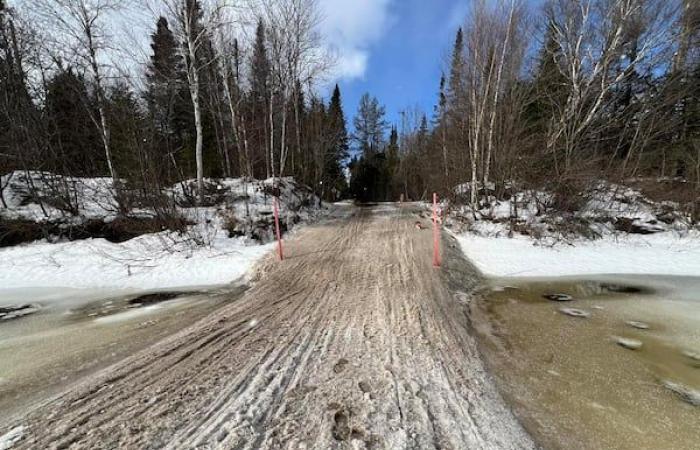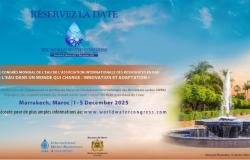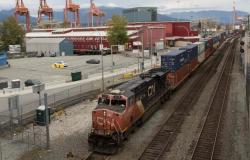Discord in Saint-Raymond
Opposition to a right of access
The imposition of an access fee to the ZEC Batiscan-Neilson has sowed discord in Saint-Raymond and its surrounding areas. The situation quickly escalated and landowners threatened to block a federal snowmobile trail.
“To fully understand the situation, we have to go back 50 years,” says Mayor Claude Duplain from the outset.
The latter says that, since he can remember, people have never had to pay to travel freely in winter on the ZEC Batiscan-Neilson.
This territory is landlocked by private properties. To access the ZEC (controlled exploitation zone), snowmobilers must therefore pass through private land.
Snowmobilers must pass through private land to get to the ZEC Batiscan-Neilson. (Patrick Woodbury/Archives Le Droit)
This is why nearly 200 property owners in Saint-Raymond allow the local snowmobile club to trace a federated trail through their land free of charge.
“For the last 50 years, there has always been great harmony between ZEC managers and snowmobile clubs,” mentions Stéphane Desroches, general director of the Fédération des clubs de motoneigistes du Québec (FCMQ).
But relations have been more stormy since the ZEC Batiscan-Neilson opened its territory during the winter of 2023-2024 for winter fishing and housing rental. It now requires a daily access fee of approximately $12.39 per vehicle year-round.
This decision came after the government asked the ZEC Network to increase its self-financing capacity.
“When the tariff measure was announced in April 2023, there was no discontent. But at the beginning of January, the disgruntled people let us know by vandalizing posters. From that moment on, there was a snowball effect,” explains the president of the ZEC Batiscan-Neilson, Isabelle Paquet.
The measure was initially received coldly by snowmobile clubs.
“For three years, we have injected $1.7 million for infrastructure on the ZEC Network, the organization put $6,000 of this amount. And it is the snowmobile clubs which surface the trails and which have the civil obligation to make them safe, not the ZEC,” laments Stéphane Desroches.
In return for these services, the FCMQ demanded that its members be excluded from pricing.
“For us, it was free for them from the outset. But it seemed misunderstood,” admits Ms. Paquet.
At the beginning of November 2024, the ZEC Batiscan-Neilson finally reached an agreement with the local Saint-Raymond snowmobile club to exempt FCMQ members from access fees, provided that they remain on the site. federated path.
However, some landowners have taken issue with the imposition of access fees on other trails.
“You have to look at it from the owners’ point of view. They have been letting snowmobilers pass through their land for free to get to the ZEC for 50 years. But all of a sudden, the ZEC is making landowners on its territory pay,” proclaims the mayor of Saint-Raymond.
In retaliation, they are now threatening to block access to the very popular federated trail 23, which provides access to Saint-Raymond.
Impasse and economy at risk
It was at this moment that the municipal administration became involved in the conflict situation.
“It doesn’t make sense to close the trails, there is a large part of the economy of Saint-Raymond that relies on snowmobiles,” says Claude Duplain.
“There are hotels that will have to close if snowmobilers cannot get to town. The traders are not happy,” he continues.
Some of them proposed closing the ZEC for the winter, as was done before. This proposal was not accepted, said the mayor.
“We need money. I have employees to pay annually, we also have expenses for the evaluation of the lakes,” explains the president of the ZEC Batiscan-Neilson.
“We are trying to self-finance and it is the landowners who are cutting off access to Saint-Raymond. We understand the traders and their concerns, but we have accountability and a territory to take care of. The C in ZEC means controlled, we cannot remove it,” she adds.
The situation is still tense in Saint-Raymond. Discussions between stakeholders are stagnating.
“We are in a complete impasse,” says the mayor.
The latter nevertheless hopes to reach an agreement with the government, landowners, snowmobile clubs, the MRC and the ZEC before the snow arrives.
Tensions in Chaudière-Appalaches and Bas-Saint-Laurent
Conflict between owners and their union
The Appalachian Private Woodlot Owners Association (APBPA) is angry with its union. The latter made a decision which goes against what the majority of private woodlot holders want. To contest this measure, the owners are revoking, among other things, the rights of way for snowmobiles.
The APBPA contests the exclusivity of the marketing of sawn and peeling wood imposed by the Union of Wood Producers of the Côte-du-Sud.
“Which means that, as soon as an owner of a private wooded area cuts down a tree on his land, he is obliged to sell it to the union which will take care of selling it to industrialists, including wood mills,” laments the president of the APBPA, Raynald Nadeau.
The Appalachian Association of Private Woodlot Owners does not want its union to have exclusive rights to market timber. (Archives Le Droit)
“The owners will therefore no longer have legal rights for the sale and the price that the union will negotiate with the wood mills will remain confidential,” he is further indignant.
As the money will pass through the hands of the union before being redistributed to private woodlot owners, Mr. Nadeau expects to receive his check almost two months after the sale.
“The union also takes care of the transport of the wood, which extends over a period of 30 days. We will therefore have a month without pay in addition to the payment period of up to 18 days,” he continues.
Of course, producers can get better prices with joint marketing, but they want to keep the choice of doing so or not.
“If an owner is not able to negotiate a good price with manufacturers, he can ask the union to negotiate in his place or even forestry groups,” says Raynald Nadeau.
The APBPA therefore demands that marketing be on a voluntary basis, to be paid directly by manufacturers, to have a freeze on the union levy and to have the choice of carrier.
“But for now, we have to pay a lawyer to defend us against our union which is supposed to protect us,” complains Mr. Nadeau.
Possible closures from Lévis to Kamouraska
Failing to have been heard, the owners of private woodlands impose a ban on passage on their land, for an indefinite period.
The president of the APBPA indicates that owners are revoking rights of way in 52 municipalities, ranging from Lévis to Kamouraska. This involves snowmobiling, hiking and cross-country skiing.
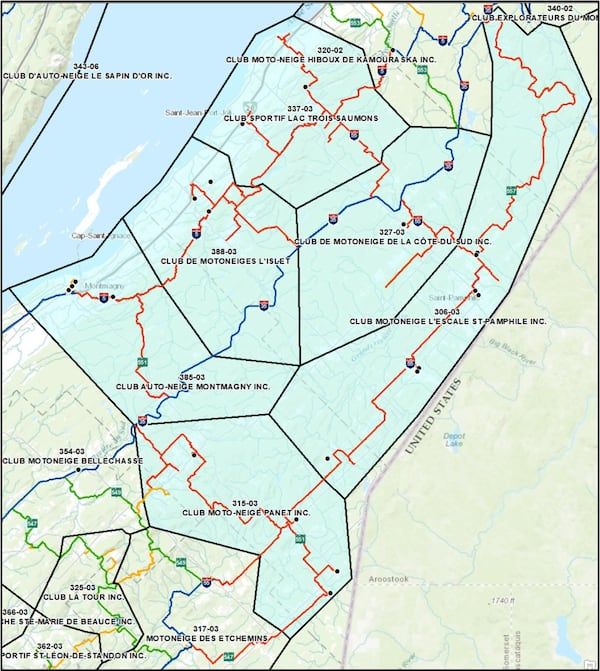
In the event of trail closures by private woodland owners, the FCMQ has redesigned its map. Federated trails 5 and 55 could be closed. (FCMQ)
“We understand the issues facing private woodlot owners. This is the only pivot they have in hand to put pressure on and demand change. We hope that the situation can be resolved before the snowmobile season,” declares the general director of the FCMQ.
Here too, concerns are being heard about the possible economic impacts of closing snowmobile trails in the area.
“We have a lot of visitors from Ontario and the United States who come to snowmobile with us. The possible closures of trails in the area create indecision and people could possibly go to other regions, which would have a notable impact on reservations,” mentions the general director of Tourisme Bas-Saint-Laurent, Pierre Lévesque. .
The snowmobile industry generates economic benefits of $20 to $25 million for Bas-Saint-Laurent.
The FCMQ claims to have another problem in the north of Gaspésie, in Rivière Madeleine. She was forced to close the footbridge, used by snowmobilers, which overlooks the Madeleine River.
Stéphane Desroches asked the Ministry of Transport to take part of Route 132 at this location to avoid closing the snowmobile trail. He is still waiting for a return.
Hoping for snow
The last snowmobile season was particularly difficult. The thin layer of snow, even ice, had forced clubs in the greater Quebec region to close trails in the middle of February, a pivotal period for the industry.
“We don’t want to have temperatures like last year, but it’s Mother Nature who will decide,” says the general director of the FCMQ.
The bad season had cooled many snowmobilers, to such an extent that several loudly proclaimed not to renew their membership cards for the 2024-2025 season.
Despite everything, nearly 74% of access rights have already been sold during the special sale for the 50th anniversary of the FCMQ.
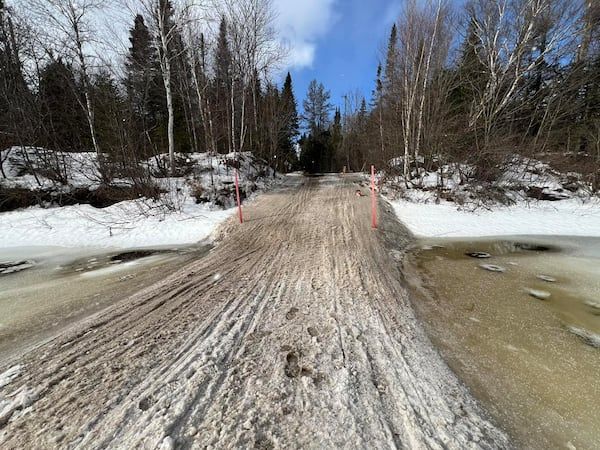
The thin layer of snow, even ice, forced clubs in the greater Quebec region to close trails in the middle of February. (Club Snowmobile of Jacques-Cartier/Facebook)
“Snowmobilers are there and it’s a real passion. For many, it helps relieve stress in winter while walking on our 33,000 km of trails,” adds Stéphane Desroches.
Although current conflicts are putting snowmobile trails in danger, Mr. Desroches estimates that 80% of routes will be open this winter.
“All that remains is to have snow,” he says.

